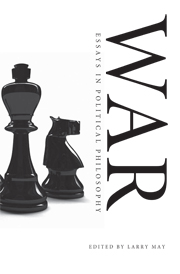Book contents
- Frontmatter
- Contents
- Contributors
- Introduction
- I HISTORICAL BACKGROUND
- II INITIATING WAR
- III WAGING WAR
- 7 Proportionality and Necessity
- 8 Collateral Damage
- 9 Weapons of Mass Destruction: Are They Morally Special?
- 10 Justifying Torture as an Act of War
- 11 On Terrorism: Definition, Defense, and Women
- IV ENDING WAR
- Bibliography
- Index
11 - On Terrorism: Definition, Defense, and Women
Published online by Cambridge University Press: 05 June 2012
- Frontmatter
- Contents
- Contributors
- Introduction
- I HISTORICAL BACKGROUND
- II INITIATING WAR
- III WAGING WAR
- 7 Proportionality and Necessity
- 8 Collateral Damage
- 9 Weapons of Mass Destruction: Are They Morally Special?
- 10 Justifying Torture as an Act of War
- 11 On Terrorism: Definition, Defense, and Women
- IV ENDING WAR
- Bibliography
- Index
Summary
This chapter deals with three issues: (1) how best to define terrorism, (2) whether terrorism is ever defensible, and (3) whether female terrorists should be held to the same standards of moral responsibility for their terrorist acts as are male terrorists.
Defining Terrorism
The word “terrorism” and its cognates have been defined in a great variety of ways. A famous study published in 1983 found 109 different definitions of terrorism already available, some of them scholarly, some political, and some legal. Commentators continue to disagree about what is the best definition.
How terrorism is to be defined is a question of practical significance and not merely theoretical interest. In the wake of the September 11 terrorist attack on the United States, the United Nations Security Council passed Resolution 1373, which imposes obligations on states to oppose terrorist activity in a variety of ways, including trying to bring it to an end, punish it, and prevent it from happening in the future. These requirements are issued internationally as uniform obligations on states, so the efforts by various states to comply with the requirements should cohere legally. Yet without a shared definition of terrorism, each state would be acting on a unilateral definition. The resulting state efforts against terrorism might not be mutually consistent or coherent. Also, in particular cases, disputes might arise as to which persons or groups are terrorists and whether particular actions are genuine incidents of terrorism or merely domestic crimes.
- Type
- Chapter
- Information
- WarEssays in Political Philosophy, pp. 204 - 226Publisher: Cambridge University PressPrint publication year: 2008
- 2
- Cited by



